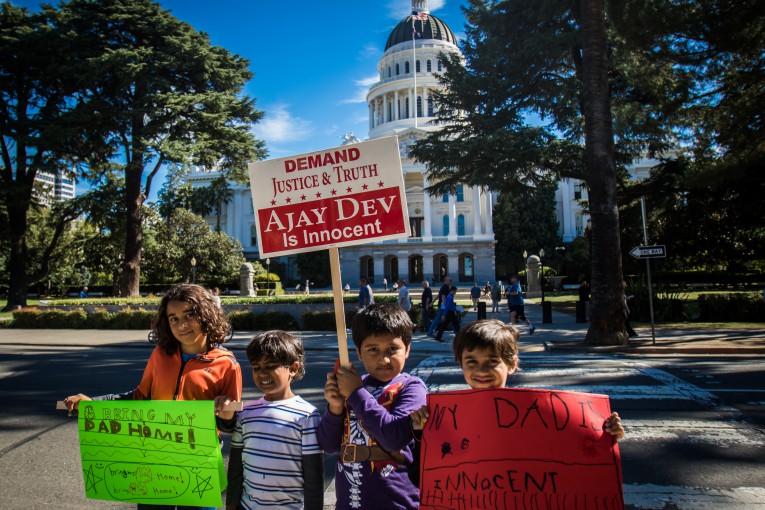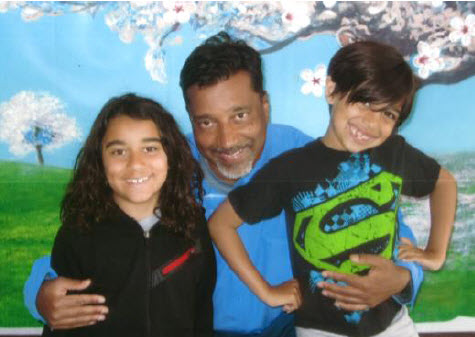

Family and supporters are still hopeful they can get an evidentiary hearing on Ajay Dev’s now decade-old case. Mr. Dev was convicted and sentenced to 378 years in prison after a 2009 trial where the jury found Mr. Dev guilty of 76 of 92 counts involving the alleged rape of his adopted daughter.
Last July, attorney Cliff Gardner filed a 102-page petition for Writ of Habeas Corpus with new evidence that Mr. Dev was innocent of these charges and that the complaining witness fabricated her story.
But justice in the legal system moves slowly and, while the family and supporters hope for an evidentiary hearing this spring, that still remains to be seen.
In the DA’s response, they argue the claims Mr. Dev and his attorneys make are “not timely,” arguing that “petitioner has failed to show (that) the claims in the instant petition were not filed ‘without substantial delay.’”
Here they argue that “such delay is measured not from the time of completion of appellate review, but from when the Petitioner reasonably could have learned of the facts relevant to the claim – which may be as early as the ‘date of conviction.’”
The DA claims: “Petitioner has not complied with that obligation” and argues that timeliness “runs from the date of conviction” and that “he badly disregards the eight-year period from conviction through  end of direct review.”
end of direct review.”
They argue: “That normally warrants asking this Court to summarily reject the claims in the petition, no matter the merits. And, indeed, respondent does ask this Court to dismiss the Claims as untimely, as a separate basis for decision irrespective of the merits. However, respondent does not ask this Court to do so at this time.”
The petitioner in July raised three claims for release. First, a claim under Strickland for “ineffective assistance of counsel in failing to investigate and present readily available evidence directly supporting the defense that counsel himself had advanced: (AV) was lying.”
Second, based on new evidence that “would more likely than not have changed the outcome at trial.” And third, “the combination of these errors together, along with several legal errors raised on appeal, violated petitioner’s right to a fair trial under federal and state law when considered together.”
In November of 2018 Judge Dave Rosenberg issued an Order to Show Cause.
The DA asks that the court reject Claim I (ineffective assistance of council) and Claim III “summarily for lack of anything to cumulate given the failure of Claim I.”
However, they invite the court to conduct an evidentiary hearing on Claim II. They note, “Claim II may survive the untimeliness bar solely to the extent it actually asserts — no matter the statutory standard — that the evidence meets the standard for relief required by the U.S. Constitution.”

Instead they argue that “an evidentiary hearing is warranted, at least as a prudential matter, as to the merits of Claim II.” Here the question is one of new evidence and evidence of innocence.
In their response, the petitioner finds the state’s timeliness argument “puzzling” in that “the state simply ignores all this additional evidence. Instead, the state makes the identical argument it made before, once again urging a finding of untimeliness because petitioner ‘could have hired an attorney, and thus filed a habeas petition, at least as early as during the appeal.’”
As the petitioner points out – there is a mountain of new evidence here that is present that is simply ignored by the DA’s office.
The respondent concludes in the motion dated February 22, 2019, “Because the state has raised disputed questions of material fact in connection with petitioner’s Strickland and new evidence claim, the Court should hold an evidentiary hearing as to those claims. The Court should schedule a Status Conference to discuss the scope and timing of the evidentiary hearing.”
Regardless, it appears that whichever way the court goes on Claims I and III, there will at least be an evidentiary hearing on Claim II.
The evidence here is substantial. While an appellate court in 2017 denied the direct appear, that direct appeal did not consider new evidence.
The key evidence presented at trial that led to wrongful conviction was a pretext phone call that supposedly corroborated the alleged victim’s testimony.
Here Judge Timothy Fall erred by allowing the victim to translate the conversation that meandered from English to Nepali. The key statement that the jury relied upon was, “But you had sex with me when you were 18.”
New technology has allowed Ajay’s defense to enhance the audio from that recording. A Nepali translator listened to the new enhanced recording and has determined that Ajay did not state what the alleged victim claimed. Instead, Ajay said, “If that (is) so, why did you come with me since 18 years?”
Appellate attorney Cliff Gardner argues: “The prosecutor’s argument that this portion of the pretext phone call constituted an admission that petitioner had sex with [S. Dev] is simply wrong. In assessing the pretext call, and counsel’s arguments, it is critical for the jurors to have an accurate translation of the pivotal portions of the call.”
The Habeas petition also presents new evidence that the alleged victim lied. There is the January 2018 Facebook message the alleged victim’s own sister sent to Ajay Dev’s brother Sanjay: “[AV] want to take revenge and get to Amrika [sic]. . . . The only way to come to Amrika [sic] was to come testify against Ajay uncle. We did not know that he will be put in jail long time. Now AV say that if she helps she will go to jail and get deported. . . . AV has lied many times in the past. She had no choice. Police say to her they will help if AV testify for rape. . . . We know that she was not raped. . . . We also tell AV to tell the truth that this never happen but she scared now.”
The alleged victim (AV) told her cousin Sangita Dev that Mr. Dev neither raped her nor inappropriately touched her. In 2004, Ms. Dev asked the alleged victim whether “Ajay is raping you?” To that the AV responded, “Nothing happened.” “Ajay did not rape or touch her,” she wrote in a declaration.
When Ms. Dev expressed concerns that Ajay Dev would get in trouble, the AV explained, “No, nothing will happen to Ajay.”
Sangita Dev explained that “because the AV was her first cousin she was too scared to initially come forward because she felt like it would be going against her family. In fact, Sangita’s mother told her to not to get involved in this ‘family mess’ and to ‘keep my thoughts to myself.’”
The AV told longtime family friend Dinesh Deo about the allegations and “AV explained to him that she believed Ajay and his family had reported her for passport fraud.”
The AV told Mr. Deo “that she would put Ajay in jail like he had put her in jail.”
Will this be enough for an evidentiary hearing and to cause a judge – likely Judge Fall – to reconsider his prior decision? That is a tough call at this point.
—David M. Greenwald reporting


Justice delayed is justice denied. Why can’t they speed this thing up? It seems like the evidence introduced in the habeas is explosive.
“[AV] want to take revenge and get to Amrika [sic]. . . . The only way to come to Amrika [sic] was to come testify against Ajay uncle.”
What does this mean? How does testifying against the uncle help AV get to the US?
Her immigration status because she wasn’t in school and because of the failing adoption was in jeopardy. But as a victim of crime, she could become a permanent resident.
Hello David, I read this and believe that the adopted daughter was lying. Is there a way the governor could pardon Ajay and prosecute the daughter? Do you know how I could contact Ajay’s family or get the court transcript?
I have all of the court transcripts. However it would probably take you at least six months to read them all – probably longer. If you really want to see them you can email me off-line and I’ll give you access to our Drop Box folder.
Thank you for the transcripts. It is good to know that the Nepal court was smart enough to know that [AV] was a fraud. I wish that someone knows what to do about our local courts.
FREE AJAY DEV!
It is as simple as that.
He is an innocent man wrongfully convicted by a rush to judgement court guilty of an obstruction of justice and violations of his right of due process and to redress grievances.